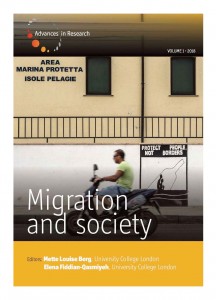 Yousif M. Qasmiyeh
Yousif M. Qasmiyeh
Creative Encounters Editor, Migration and Society
In poetry we hunt down details in the hope of preserving them and, in so doing, we assert our commitment to re-reading the daily and re-inventing the becoming.
In Creative Encounters, our modest aim, in this inaugural edition of Migration and Society, is to embroider the voice with its own needle: an act proposed to problematise the notion of the voice; something that cannot be given (to anyone) since it must firmly belong to everyone from the beginning. In voice, we look for our own meaning in this narrow-vast world. We look for something to cling to for the sake of passing time – something that reminds us of our presence as scattered voices.
In Mohamed Assaf’s poems, published in this edition of Creative Encounters, nothing seems young save the poet or more precisely his real age. In his observations, memories are as conspicuous as the sky on a clear day and as precise as an archivist’s. He writes what takes him back to his place: Syria, but also what he sees in the vicinity of his body – the body which has had to endure multiple flights in multiple times. Not with our approval but in spite of it, Mohamed writes the archive of what it means to live a life whose meaning is reduced to one’s own survival – a bodily survival – in the midst of such formidable physical and aesthetic destruction.
Mohamed’s name as printed in English M-o-h-a-m-e-d is not the name which was conferred upon him by the woman who gave birth to him in the place of his Arabic language. Rather, it is the transliterated twin of his name. It may be considered an equivalence or another proper noun which marks a change that will always be carried in the name, that is: the pronunciation of the new. Or, more pertinently, a trace of his definite name which is, as his poetry, still travelling in all directions.
Five poems by Mohamed Assaf*
Five poems were written by Mohamed Assaf – a young Syrian boy who currently lives in Oxford with his family and studies at Oxford Spires Academy – under the mentorship of the poet Kate Clanchy. View the Poems.
*Five Poems by Mohamed Assaf will be available to access until 1/31/2019.
To access the entire inaugural issue of Migration and Society until 1/31/2019, please use code: MS2019. To redeem, please visit: www.berghahnjournals.com/redeem.







